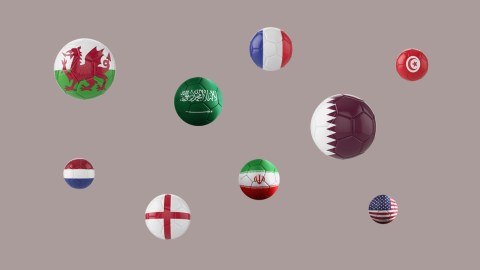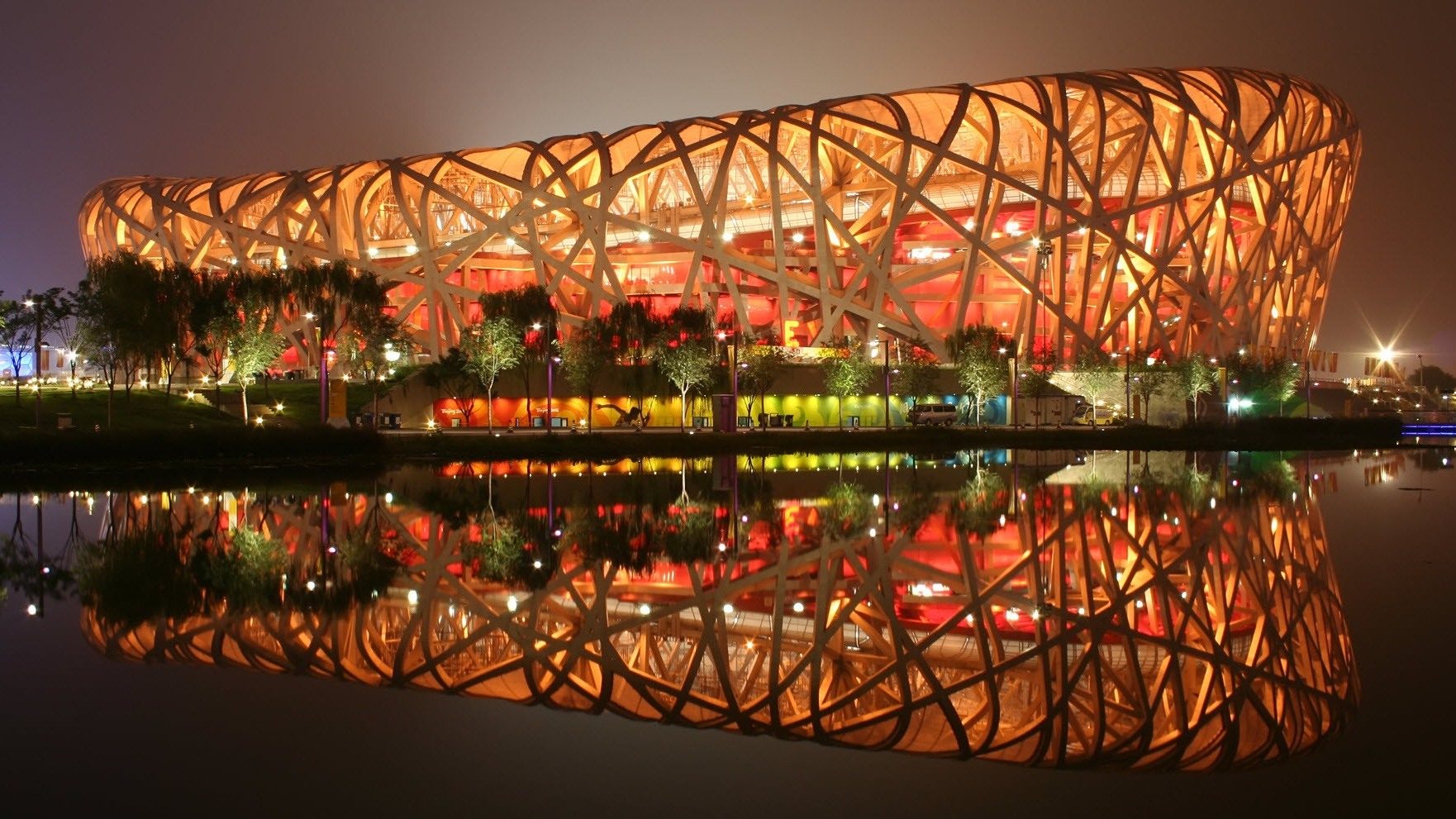5 geopolitical clashes to watch for at the 2022 World Cup

- Qatar, with a history of human rights violations and its suspected bribery of FIFA officials, was a controversial choice for the 2022 World Cup.
- But the politics doesn’t stop there. Here are five heated geopolitical rivalries to watch out for, from U.S. vs Iran to England vs Wales.
- The world is waiting in eager anticipation to see what happens — both on and off the pitch.
The 2022 FIFA World Cup kicks off on Sunday. As is tradition, it will open with the host country (Qatar) playing the first match, which will be against Ecuador — a fixture that probably won’t get the pubs brimming with crowds. Qatar has never before made the finals of a World Cup, and were it not for their hosting the event, it likely would not be in the tournament. Ecuador has only once made it past the group stage.
But sometimes, the most exciting thing about a football match is not necessarily the teams on the pitch, but the geopolitical stories behind the scenes. It’s about the historical tensions and rivalries. It’s about what happens off the pitch more than what happens on it.
Here are five of the most interesting, upcoming (or potentially upcoming) geopolitical matchups of the World Cup.
U.S. vs. Iran
Iranians are a proud people. Persia (their former name) has a good claim for being the first nation-state, and the Persian Empire stands as a giant of culture and philosophy. So, when the U.S. (and many others) started meddling in Iranian internal politics during the 1950s, largely because of oil, it was always likely to end badly. The U.S. continued to prop up and support the shah (king), despite his dubious legitimacy, because doing so meant oil deals and Middle Eastern leverage.
If you’ve watched Argo, you’ll know what happens next. In 1979, an Islamic-led revolution ousted the U.S.-backed shah and replaced him with Ayatollah Khomeini — a Shi’ite cleric of a very strict form of Islam. Since then, the U.S.-Iran story has been one of almost constant animosity. The U.S. is the “Great Satan” while Iran is “the world’s biggest state sponsor of terrorism.” Iran accuses the U.S. of neoimperialistic ambitions and violating state sovereignty, while the U.S. accuses Iran of human rights violations, sponsoring terrorism, and covertly building nuclear weapons. Both sides are probably right — but let’s see them duke it out 11-on-11 on the pitch! The match is Tuesday, November 29 at 2 pm ET.
England vs. Wales
Prince William is now the Prince of Wales, the official title given to heirs of the British throne. In sporting terms, this has opened a whole can of worms. For those who don’t know (like Ted Lasso, who famously asked, “How many countries are in this country?”), Britain is a state made up of four nations — England, Scotland, Wales, and Northern Ireland. So, for a prince to support one while representing all is tricky business. “Prince William walks diplomatic tightrope over World Cup allegiance,” wrote the Telegraph, and the actor Michael Sheen has openly criticized William for his previously passionate and exaggerated support of England. If William represents the UK, who should he support when the two compete? Who does a parent want to win when his children are fighting?
Compared with Scotland, Wales has never been as vociferously independence minded. While the Scottish National Party gets around 40% of the vote (and control of their parliament), the Welsh nationalists (Plaid Cymru, pronounced PLYDE KUM-ree) get only 20% and languish in third place. The banter between Wales and England is mostly playful and harmless. But, in political terms, as many eyes will be on the heir apparent, William, as on the football being played. The match is set for Tuesday, November 29 at 2 pm ET.
Tunisia vs France
When an ex-colony plays a former colonist, you can usually expect fireworks. In the 1950s and 1960s, countries all over the world were either given independence or forcibly, bloodily, wrenched it from European hands. While Algeria was much the more infamous and brutal revolution, the Tunisian independence movement also attacked colonial buildings and assassinated leading French administrators. Since then, Franco-Tunisian relations have been complicated.
France spent a lot of the 20th century supplying Tunisia with weapons, but since has been replaced by the U.S. and Turkey. French influence in the country is waning. France is no longer an empire, but like a lot of European countries, it feels like it has a special role to play in its former colonies (often concerning economic privileges). It’s something Tunisia might not agree with. The match is scheduled for Wednesday, November 30 at 10 am ET.
Netherlands vs. Qatar
There is very little officially at odds between these two countries, but this match is more about a battle of ideologies. The Netherlands is famous, worldwide, for its liberalism and freedom. If an 18-year-old comes back from a long weekend in Amsterdam, you don’t need to ask what happened. The International Criminal Court — the body charged with finding and prosecuting human rights violations — is based at The Hague, in the Netherlands.
And yet, Qatar is the opposite. It’s a highly conservative, hardline Islamic, absolute monarchy. It’s a country notorious for its human rights violations, from migrant worker slavery to women’s rights. The very fact that Qatar won the FIFA bid to host the World Cup is marred by corrupt, underhanded wads of cash. The majority of the 22 FIFA executives who awarded Qatar the World Cup are facing indictments, investigations, or bans of some kind. So, that the Netherlands even went to Qatar is politically charged. The government even had to come out and defend its decision as an “opportunity for dialogue and cooperation.” The match is set for Tuesday, November 29 at 10 am ET.
Iran vs. Saudi Arabia
If you had to form a list of the biggest rivalries in geopolitics, topping that list would probably be South vs. North Korea, India vs. Pakistan, or Iran vs. Saudi Arabia. While these two are not in the same group, it’s a possible (if unlikely) scenario for the quarter finals.
All over the Middle East, Islam is largely divided into two denominations: Shi’a and Sunni. Sunni makes up roughly 85% of the world’s Muslims, while Shi’a is 15%. Because Iran is dominated by Shi’a Islam and Saudi Arabia by Sunni Islam, conflicts are always politically, culturally, and religiously charged.
Both being oil exporters, they are also economic rivals. Furthermore, they have chosen opposing geopolitical sides, with Saudi Arabia aligning with the U.S. and Iran with Russia. Both countries would have a lot to lose in a full-scale interstate conflict (Iran has the much bigger military, but Saudi Arabia has the much more useful ally), so the two resort mostly to proxy wars — like in Syria, Yemen, and perhaps the FIFA World Cup.
Keeping things sporty
Football fans are not known for their calm moderation and chivalrous good grace. So, any World Cup will need a lot of security. Never is this more the case than in Qatar. Qatar is working with five other countries to ensure the safety of all 1.2 million fans. Turkey is sending 3,000 riot police; Morocco is sending cybersecurity teams; France is sending a small contingent of troops; the British Royal Navy will deploy battle fleets to the region; and the U.S. Secret Service is helping advise the Qataris.
All together, it’s thought that Qatar has spent around $220 billion on hosting the World Cup. And while the football will be played out on TVs across the world to about half the globe’s population, the geopolitical results might be just as interesting.





